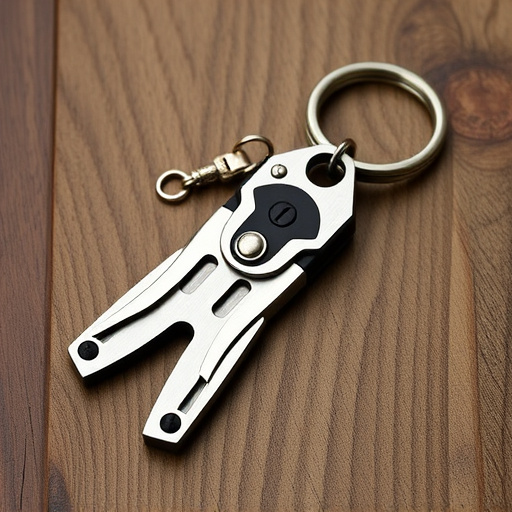Students interested in personal safety should understand the legal aspects of carrying compact student defense keychain tools, which vary greatly by U.S. state. Age restrictions, permit requirements, and school policies differ, with some states allowing non-lethal tools without a permit while others mandate licensing or registration. It's crucial to check local laws, school regulations, and seek professional advice to avoid legal penalties, as proper authorization is essential for carrying these devices.
“In today’s world, personal safety is paramount, especially for students. This guide explores the legal landscape surrounding compact self-defense keychain tools in various states. We break down what constitutes a legitimate self-defense keychain and navigate state-specific regulations.
From eligibility criteria to potential consequences of unauthorized carrying, this article ensures you’re informed. Discover the key considerations when it comes to these compact student defense keychain tools and stay ahead of legal requirements.”
- Understanding Legal Definitions: What Counts as a Self-Defense Keychain?
- State-Specific Regulations: A Comprehensive Overview
- Eligibility and Age Restrictions: Who Can Carry and Under What Conditions?
- Legal Consequences of Unauthorized Carrying: Penalties and Exceptions
Understanding Legal Definitions: What Counts as a Self-Defense Keychain?
In the context of self-defense, understanding what constitutes a legal “keychain tool” is paramount for students considering their options for personal safety. The definition can vary across states, but generally, a compact student defense keychain tool refers to a small, easily portable device designed to deter potential attackers and provide a means of protection in various situations. These tools often include features like a small pepper spray canister, a pocket knife with a sharp blade, or even a metal rod designed to disrupt an attacker’s grip.
Key to navigating the legal requirements is recognizing that many states have specific regulations governing the carrying of such devices. Some allow them for individuals over a certain age or with a valid permit, while others may restrict their use entirely in public spaces. Students should familiarize themselves with local laws, ensuring they understand not only what tools are permitted but also where and how they can be carried legally to maintain personal safety without inadvertently violating any regulations.
State-Specific Regulations: A Comprehensive Overview
In the United States, the legal landscape regarding compact student defense keychain tools varies significantly from state to state. Each jurisdiction has its own set of regulations governing what constitutes legal self-defense and the permissibility of carrying personal defense tools like keychains. For students considering arming themselves with these compact devices, understanding the specific laws in their respective states is paramount.
State-specific regulations cover a wide range of factors, including age restrictions, permit requirements, and permitted types of self-defense tools. Some states allow certain forms of non-lethal self-defense without a permit, while others mandate explicit licensing or registration for any personal defense device. Additionally, there might be specific prohibitions against carrying such tools on school premises or in certain public spaces. Students must familiarize themselves with these nuanced rules to ensure compliance and avoid potential legal repercussions.
Eligibility and Age Restrictions: Who Can Carry and Under What Conditions?
In many jurisdictions, the eligibility and age restrictions for carrying self-defense keychain tools like compact student defense keychains are governed by specific laws and regulations. Typically, individuals aged 18 or older are permitted to own and carry such devices, provided they meet certain legal requirements. The primary condition usually involves demonstrating a legitimate need for self-defense, which can be established through factors such as personal security concerns, previous incidents of harassment or violence, or being in high-risk environments like isolated areas or poorly lit streets.
Students considering carrying a compact student defense keychain should also be aware of any institutional policies regarding campus carry laws. While some schools allow students to possess and carry self-defense tools for personal safety, others may have strict rules prohibiting the open display of such devices on campus. Students should review their school’s policy manual or contact relevant authorities to understand the specific regulations governing the carrying of compact student defense keychain tools in academic settings.
Legal Consequences of Unauthorized Carrying: Penalties and Exceptions
Carrying a self-defense keychain without proper authorization can lead to severe legal consequences. Many states have strict laws regarding the possession and use of personal defense tools, especially if they are easily concealable like compact student defense keychains. The penalties for unauthorized carrying can include fines, arrest, and in some cases, even jail time. These strict measures aim to prevent the misuse of such devices and ensure public safety.
Exceptions do exist, however, which vary by state. For instance, some states allow individuals to carry self-defense tools if they have a valid reason, such as personal protection or defense of property. Certain professions, like security guards or law enforcement officers, may also be exempt from certain restrictions. It’s crucial for individuals considering carrying a compact student defense keychain to understand these legal nuances and ensure compliance with local laws to avoid facing the consequences.
When it comes to carrying a compact student defense keychain, understanding the legal requirements is essential. This article has provided an in-depth look at state-specific regulations, eligibility criteria, and potential consequences. By familiarizing yourself with these rules, you can ensure compliance while also gaining peace of mind knowing you’re prepared for any unexpected situations. Remember, staying informed about your rights and responsibilities is key to responsible self-defense.
